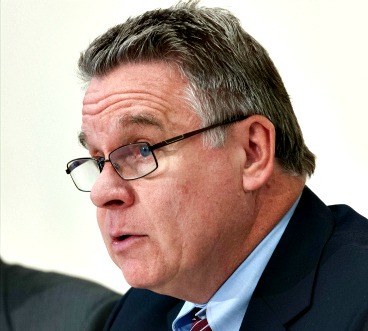By Maureen T. Walsh,
CSCE General Counsel
On July 16, 2002, the Commission on Security and Cooperation in Europe held a public hearing titled “Property Restitution in Central and Eastern Europe: The State of Affairs for American Claimants” on the status of property restitution, with a particular focus on claims in Poland, the Czech Republic, and Romania. This was the Commission’s third hearing on the issue of property restitution; previous hearings were held in 1996 and 1999.
In his opening statement, Commission Co-Chairman Rep. Christopher H. Smith (R-NJ) acknowledged that “Central and East European governments have done much regarding property restitution that is commendable.” Smith noted that “governments seeking membership in Western institutions want to be perceived as reform governments by passing a private property restitution law. . Upon closer examination, however, one finds lackluster the implementation of the laws” as well as serious rule of law problems and discriminatory citizenship requirements that continue to impede restitution and compensation efforts.
Commissioner Rep. Joseph R. Pitts (R-PA) expressed the need for countries addressing problems created by the legacies of fascism and communism to “address all pertinent issues and cases, including claims of those individuals or families who may fall between the cracks of current laws.”
According to Commissioner Rep. Benjamin L. Cardin (D-MD), barriers to restitution and compensation dealt the survivors of the Holocaust a second tragedy. In response, he made clear that “we will not stop until all the OSCE states treat property restitution in a serious way by having effective laws to compensate for illegally confiscated property.”
Commissioner Senator Hillary Rodham Clinton (D-NY) expressed a need “to constantly be creating an atmosphere in which these claims are viewed as appropriate, legitimate, and justiciable.” She stressed “the rapid restitution of assets that were stolen during that horrible period is a critical step towards achieving some measure of fairness.” “As the countries of Eastern and Central Europe consider reforming their property restitution laws, they can look to the United States as a leader in considering the restitution of World War II era property,” Senator Clinton concluded.
Rep. Joseph Crowley (D-NY), a member of the House International Relations Committee, urged the Bush Administration to ensure that progress on property restitution claims be considered as a component for European Union membership. Rep. Crowley’s remarks focused on the lack of a private property restitution law in Poland where he stated “as many as 170,000 property owners and their heirs still wait for legislation that will restore their rights.” He also noted that “the protection of property rights is a basic requirement for all democratic governments that operate under the rule of law.”
Witnesses reiterated two themes throughout the hearing: the protection of property rights as a requirement of democratic governments and the need for states to recognize their responsibilities to resolve outstanding restitution claims.
The first witness, Special Envoy for Holocaust Issues at the U.S. State Department, Randolph Bell, said the U.S., in its diplomatic relations, emphasizes that restitution processes must be clear, straightforward and non-discriminatory. Countries are encouraged to adopt broad legislation that provides restitution for the variety of claims which are being made.
Mr. Bell remarked, “in joining the Euro-Atlantic mainstream and applying for membership in organizations, [Central and East European states] are seeking to join a community of values.” He outlined the following principles that these states should bear in mind when addressing property restitution:
- Restitution laws should govern both communal property owned by religious and community organizations, and private property owned by individuals and corporate entities.
- To document claims, access to archival records frequently requiring government facilitation is necessary. Reasonable alternative evidence must be permitted if archives have been destroyed.
- Uniform enforcement of laws is necessary throughout a country.
- The restitution process must be non-discriminatory, there should be no residence or citizenship requirement.
- Legal procedures should be clear and simple.
- Privatization programs should include protections for claimants.
- Governments need to make provisions for current occupants of restituted property.
- When restitution of property is not possible, adequate compensation should be paid.
- Restitution should result in a clear title to the property, not merely the right to use the property.
- Communal property should be eligible for restitution or compensation without regard to whether it had a religious or secular use. Some limits on large forest or agricultural holdings may be needed.
- Foundations managed jointly by local communities and international groups may be appropriate to aid in preparation of claims and to administer restituted property.
- Cemeteries and other religious sites should be protected from desecration or misuse before and during the restitution process.
Mr. Bell emphasized the common goals of the legislative and executive branches in pursuing these issues. He recommended Congress and the Administration continue to encourage Central and East European states to enact addition legislation to allow greater property restitution and to hold the governments of those states accountable to the public declarations they have previously made.
The second panel of witnesses was comprised of Israel Singer, President of the Conference on Jewish-American Claims against Germany and Co-Chairman of the World Jewish Restitution Organization; Yehuda Evron, U.S. President of the Holocaust Restitution Committee; Mark Meyer, attorney and Chairman of the Romanian-American Chamber of Commerce; and Olga Jonas, economist and member of several non-governmental organizations addressing issues in the Czech Republic. These witnesses’ statements revealed broad dissatisfaction with the current status of restitution efforts.
Israel Singer reported that many East European states had “enacted restitution legislation with cut-off dates with the effect, whether intended or not, of restricting the rights of Jewish communities and others with legitimate claims to reclaim their property.” He emphasized the critical importance of timeliness in resolving restitution claims by stating that Holocaust survivors are dying at a rate of 15 percent per year. Singer urged the Commission to pursue three goals: first, to follow his “report card” on countries’ efforts toward restitution and to insist on greater accountability for any shortcomings. Second, to question why NATO allies allow property restitution to be used as an excuse for anti-Semitism within their borders. And third, to reiterate to these allies that resolution of property restitution issues is not only a material obligation, but also a moral obligation.
Yehuda Evron’s testimony focused on restitution in Poland where, Evron said, “Efforts to return property to former owners have been uneven, and often unsuccessful or worse, discriminatory.” Like Mr. Singer, he reiterated the dire need for resolution of these claims and declared the efforts thus far to resolve American claims in Poland a failure. Evron noted the law on restitution which the Polish Government is currently crafting will reportedly offer a symbolic monetary compensation to the rightful owners rather than actual return of confiscated property. Describing why Holocaust survivors will not be satisfied with symbolic compensation, Mr. Evron explained, “We survivors lost all of our families. The homes that are left are the only thing left from our family. There is no money in the world that can compensate for this house, and we don’t want any money.”
Mark Meyer described the property restitution situation in Romania. Mr. Meyer, an attorney with extensive experience representing property claimants, acknowledged Romania’s efforts in passing a restitution law, but criticized the law for having “so many exceptions to the overall principle of in-kind restitution that in fact it is not providing very much in the way of in-kind restitution at all. Instead it offers restitution in the equivalent.” Meyer described the claims process as a “procedural morass” and a “bureaucratic meltdown” because of the multiplicity of obstacles facing claimants. Meyer recommended that Romania broaden in-kind restitution. When in-kind restitution is not feasible, he suggested that long-term bonds be issued rather than cash compensation. He also argued for the inclusion of personal property restitution in any amendments to the Romanian restitution law. Meyer noted the importance of Romania rescinding Law 112 of 1995 which currently allows tenants of seized property to purchase that property, thus further complicating return of the property to the original owner.
Olga Jonas testified concerning property restitution in the Czech Republic. Ms. Jonas criticized Czech policy on the return of confiscated properties as being intended “to directly benefit communist and former communist functionaries who have acquired these properties or who hope to acquire them in privatization.” Ms. Jonas enumerated several particularly egregious restrictions on property restitution including the disallowance of restitution to “all persons who are not considered Czech citizens by the Czech Government, to legal persons, and to those victims whose Nazi-confiscated assets were to be returned by the 1945 restitution laws but [which were not actually returned] before the communist takeover.” She noted the U.N. Human Rights Committee’s multiple rulings that by denying U.S. citizens the right to restitution of confiscated property the Czech Government has violated the non-discrimination requirement of the International Covenant on Civil and Political Rights.
Two days after the hearing, Co-Chairman Smith hand-delivered a letter to Polish President Aleksander Kwasniewski during a meeting with congressional leaders in Washington, stressing the urgent need for a non-discriminatory law governing restitution or compensation of private property confiscated from individuals by the Nazi or communist regimes in Poland. In response, President Kwasniewski underscored Poland’s good will in tackling this problem, which he characterized as more difficult in Poland that some other countries because of post-World War II border changes. He said he expected to have a draft law ready by the beginning of next year — one that would not include any citizenship restrictions.
The United States Helsinki Commission, an independent federal agency, by law monitors and encourages progress in implementing provisions of the Helsinki Accords. The Commission, created in 1976, is composed of nine Senators, nine Representatives, and one official each from the Departments of State, Defense, and Commerce.
United States Helsinki Commission intern Georgianna Gaines contributed to this article.







